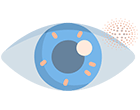Cone Rod Dystrophy Precision Panel
Cone Rod Dystrophies (CRDs) are a clinically and genetically heterogeneous group of inherited retinal diseases characterized by cone photoreceptor degeneration which can lead to rod photoreceptor loss.


Cone Rod Dystrophies (CRDs) are a clinically and genetically heterogeneous group of inherited retinal diseases characterized by cone photoreceptor degeneration which can lead to rod photoreceptor loss. The main feature of these disorders is progressive loss of central vision, color vision disturbances and light disturbances. There are more than 30 types of cone-rod dystrophies, differentiated by their genetic cause and pattern of inheritance which can be autosomal recessive, autosomal dominant and X-linked. These disorders can occur alone without any other signs and symptoms or they can be associated to a syndrome that affects multiple organs.
The Igenomix Cone Rod Dystrophy Precision Panel can be used to make an accurate and directed diagnosis as well as a differential diagnosis of blindness ultimately leading to a better management and prognosis of the disease. It provides a comprehensive analysis of the genes involved in this disease using next-generation sequencing (NGS) to fully understand the spectrum of relevant genes involved.
The clinical utility of this panel is:
Birtel, J., Eisenberger, T., Gliem, M., Müller, P. L., Herrmann, P., Betz, C., Zahnleiter, D., Neuhaus, C., Lenzner, S., Holz, F. G., Mangold, E., Bolz, H. J., & Charbel Issa, P. (2018). Clinical and genetic characteristics of 251 consecutive patients with macular and cone/cone-rod dystrophy. Scientific reports, 8(1), 4824. https://doi.org/10.1038/s41598-018-22096-0
Gill, J. S., Georgiou, M., Kalitzeos, A., Moore, A. T., & Michaelides, M. (2019). Progressive cone and cone-rod dystrophies: clinical features, molecular genetics and prospects for therapy. The British journal of ophthalmology, 103(5), 711–720. Advance online publication. https://doi.org/10.1136/bjophthalmol-2018-313278
Hamel C. P. (2007). Cone rod dystrophies. Orphanet journal of rare diseases, 2, 7. https://doi.org/10.1186/1750-1172-2-7
Boulanger-Scemama, E., El Shamieh, S., Démontant, V., Condroyer, C., Antonio, A., Michiels, C., Boyard, F., Saraiva, J. P., Letexier, M., Souied, E., Mohand-Saïd, S., Sahel, J. A., Zeitz, C., & Audo, I. (2015). Next-generation sequencing applied to a large French cone and cone-rod dystrophy cohort: mutation spectrum and new genotype-phenotype correlation. Orphanet journal of rare diseases, 10, 85. https://doi.org/10.1186/s13023-015-0300-3
Tsang, S. H., & Sharma, T. (2018). Progressive Cone Dystrophy and Cone-Rod Dystrophy (XL, AD, and AR). Advances in experimental medicine and biology, 1085, 53–60. https://doi.org/10.1007/978-3-319-95046-4_12